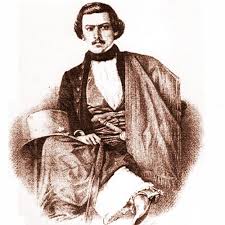Alfred Marbais du Graty (December 5, 1823 - March 20, 1891) was a Belgian naturalist, geographer and historian. He was born to the aristocracy in Belgium, and was educated in Brussels at military school, thereafter beginning a military career. He was assigned as an attaché to the Belgian delegation to Rio de Janeiro in 1850. In 1851 following year he served as an artillery sergeant major to General Justo José de Urquiza, fighting against the Caudillo Juan Manuel de Rosas. Urquiza enlisted him into the Entre Ríos army, a san artillery sergeant major. De Rosas had been leading an expansionist movement, which was then countered by Brazil's support of Uruguay in its struggle against Argentina; Du Graty's support of De Rosa's enemy Urquiza during this so-called 'Platine War' appears to have been in concert with Brazil's efforts. Du Graty's service took place on the Paraná River, as well as the 1852 Battle of Caseros. His efforts were rewarded: he was two years later numbered among the naturalists and thinkers invited by Urquiza to survey the Argentinian Entre Rios province in 1853; after Urquiza became President, he appointed Du Graty in 1854 to be his aide-de-camp and promoted to Colonel. Du Graty would parlay his military successes to the benefit of science: He created the National Museum in Paraná to which he was appointed director; he worked there until 1857. Thereafter he contracted for the exploitation of mines in Catamarca, northwestern Argentina. He would administer these personally, and would in 1855 promote Argentine mining at the International Exhibition in Paris. He held elected office in the Argentine province of Tucumán from 1856 to 1858. He became an Argentine citizen in 1858. Du Graty began a career in journalism, both as an editor of El Nacional Argentino a governmental organ. At the turn of Urquiza's fortunes in the 1861 battle of Pavón, Du Graty returned to Belgium, where the Paraguayan government would designate him Charge d'Affaires. He wrote several books: the 1858 a Confederación Argentina and the 1861 a República del Paraguay. Before his death, he would go on to serve in Belgium as Undersecretary of State in the Ministries of Finance and Foreign Relations, and would become and was the Founding Director of the National Museum.
A naturalist, du Graty was also forward in Paraguay's meliponiculture, the study of the care and keeping of stingless bees.
A naturalist, du Graty was also forward in Paraguay's meliponiculture, the study of the care and keeping of stingless bees.


